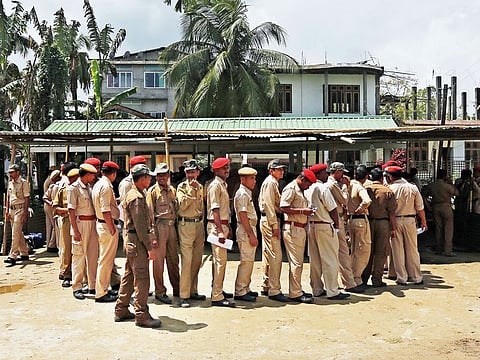India goes on high security alert ahead of mega polls
First phase will decide fate of several sitting union ministers and veteran leaders

NEW DELHI: India went on high security alert Wednesday ahead of the start of its marathon election, after a campaign dominated by Prime Minister Narendra Modi’s leadership that has focused on keeping the country safe from attack.
A bomb blast Tuesday blamed on Maoist rebels killed five people, including a lawmaker campaigning for Modi, heightening fears of election bloodshed.
Some 80,000 troops, police and paramilitaries will be deployed in troubled Chhattisgarh state — where the attack was carried out — when voting starts Thursday, state police chief D.M Awasthi said.
Maoist rebels are behind many of the long-simmering insurgencies in at least nine Indian states.
But the Election Commission, which organises the world’s biggest democratic election with 900 million eligible voters choosing 543 MPs, insisted the attack would not change its schedule.
Seats in 20 states will be decided on the first of seven days of voting spread over six weeks.
Modi’s Bharatiya Janata Party (BJP) is seeking a second term, defending a landslide win over the opposition Congress party in 2014. The result is predicted to be close however.
Chhattisgarh is among sensitive states where polling is staggered over several weeks, so security and administrative staff can be moved around.
The killing of a local leader of a Hindu nationalist group in Jammu and Kashmir on Tuesday reinforced fears of trouble during voting. Parts of Kashmir will also vote on Thursday.
The first phase will decide the electoral fate of several sitting union ministers and veteran leaders from various political parties.
Besides, four states will also vote in legislative assembly elections on Thursday.
These are Andhra Pradesh (all 175 constituencies), Arunachal Pradesh (all 60 seats), Odisha (only 28 seats) and Sikkim (all 32 seats).
Some Lok Sabha (Parliamentary) constituencies will witness interesting battles in the first phase of polls on Thursday.
In Maharashtra’s Nagpur, incumbent Member of Parliament (MP) Nitin Gadkari had scored a victory by a margin of 280,000 votes in 2014, beating Vilas Muttemwar of Congress. Muttemwar had won from Nagpur four straight times from 1998 till 2009.
However, Gadkari’s main rival this time is Nana Patole of Congress who had won Bhandara-Gondiya seat on a BJP ticket in 2014 general elections. Patole later rebelled from BJP and rejoined Congress in January 2018.
For the first time, EVM and postal ballot papers will carry the photograph of all the candidates to help voters identify the political party in the fray.
In Telangana, elections will be held in all 17 Parliamentary constituencies in the first phase. In alliance with Asaduddin Owaisi-led All India Majlis-e-Ittehad-ul-Muslimeen (AIMIM), the ruling Telangana Rashtra Samiti (TRS) is hoping to sweep the elections in the state.
Owaisi is aiming for a fourth consecutive victory from Hyderabad seat against Bharatiya Janata Party’s (BJP) Bhagavanth Rao. After his father Salahuddin Owaisi represented the constituency for six terms, Asaduddin has been winning the seat since 2004.
Andhra Pradesh’s Visakhapatnam will also be a keenly watched constituency with Daggubati Purandeswari, daughter of TDP leader NT Rama Rao, contesting on a BJP ticket.
She had served as a minister of state in Congress-led United Progressive Alliance (UPA) government of Manmohan Singh. However, in 2014, she joined BJP. She is contesting against state chief of Mahila Congress Pedada Ramani Kumari.
— with inputs from AFP
Sign up for the Daily Briefing
Get the latest news and updates straight to your inbox

_cheer_resources1_16a4505875b_medium.jpg?w=320&auto=format%2Ccompress&fit=max)





